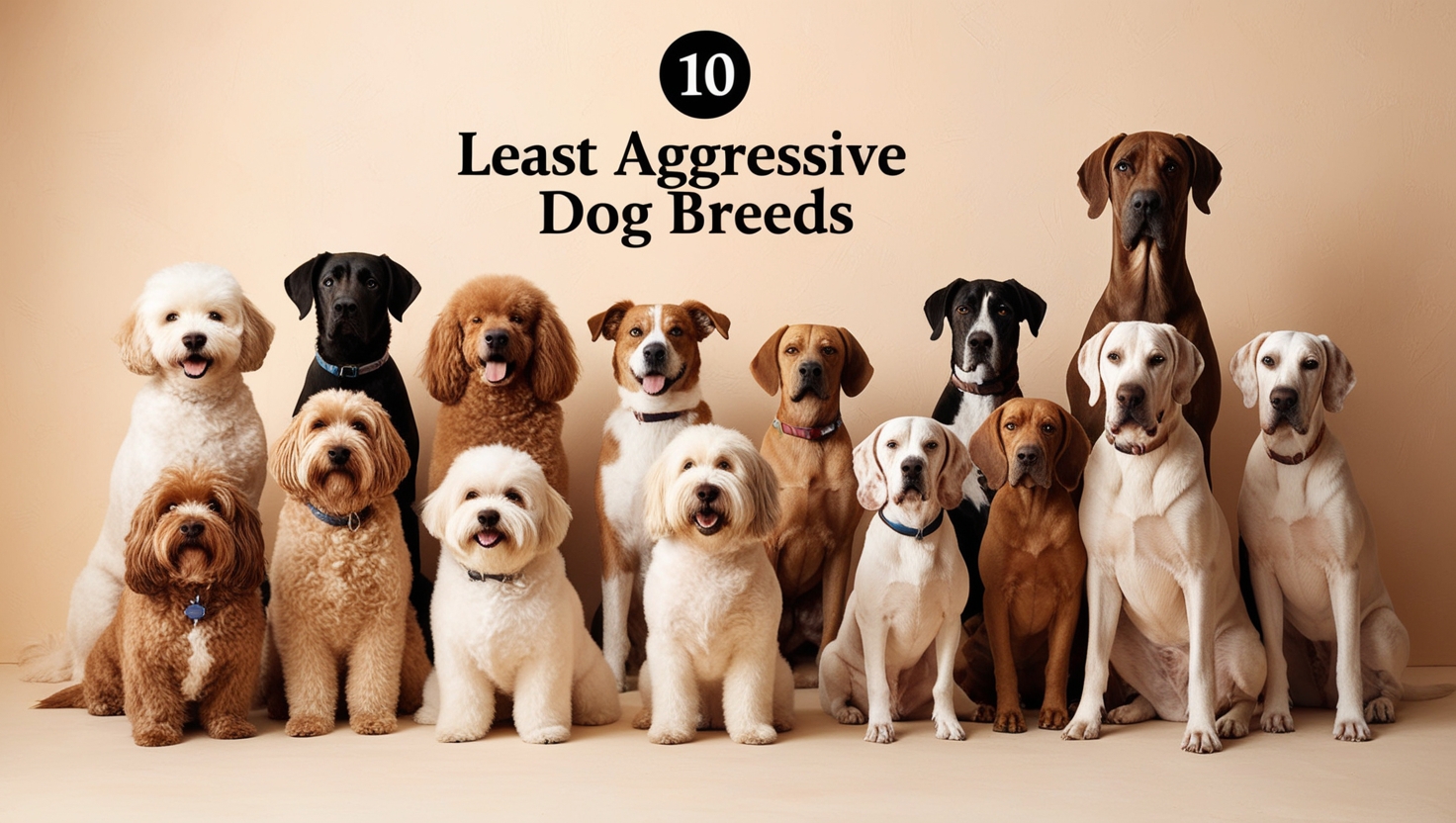When considering adding a dog to your family, it’s important to choose a breed that matches your lifestyle. For those seeking a calm and friendly companion, selecting a breed known for its gentle temperament is key. While all dogs are individuals, some breeds are generally recognized for being more docile and less aggressive. In this article, we’ll explore the least aggressive dog breeds and help you determine which might be the best fit for your home.
Understanding Aggression in Dogs
Before diving into specific breeds, it’s essential to understand that aggression in dogs is often a result of upbringing, training, and socialization, not just genetics. Even the gentlest breed can display aggressive tendencies if poorly treated, while traditionally more assertive breeds can be peaceful if raised with care. Early socialization and positive reinforcement are vital for nurturing a dog’s calm and friendly nature.
Least Aggressive Dog Breeds
Here are some of the most non-aggressive dog breeds known for their gentle dispositions.
1. Golden Retriever

Golden Retrievers are famous for their friendly and tolerant nature. These dogs are great for families due to their playful demeanor and patience with children. They are also known for being highly trainable and eager to please, making them excellent service and therapy dogs.
Internal link suggestion: Are Carrots Good for Dogs?
External link: Learn more about why Golden Retrievers are great therapy dogs from the American Kennel Club (AKC).
2. Labrador Retriever

Labrador Retrievers are another breed that excels in both family environments and as service animals. Known for their playful energy and loyal nature, Labs are friendly toward strangers and other animals. They rarely display aggression if properly trained and socialized from an early age.
Internal link suggestion: Why Do Dogs Lick Their Paws?
External link: Find out more about the Labrador’s temperament at the AKC website.
3. Cavalier King Charles Spaniel

The Cavalier King Charles Spaniel is a small dog with a big heart. Known for being affectionate and gentle, this breed thrives in homes where they can get lots of attention. Cavaliers are rarely aggressive and are great companions for children and older adults alike. Their calm demeanor also makes them ideal for apartment living.
Internal link suggestion: Can Dogs Eat Shrimp?
External link: Learn more about this breed’s affectionate nature from the Cavalier King Charles Spaniel Club.
4. Shih Tzu

Shih Tzus are famous for their cheerful and outgoing personalities. Bred to be companions, they are among the least aggressive small breeds. They are known for being friendly toward strangers, children, and other pets, making them a popular choice for families and apartment dwellers alike.
Internal link suggestion: Can Dogs Eat Pickles?
External link: For more information on the Shih Tzu’s temperament, visit VetStreet.
5. Beagle

Beagles are one of the most easy-going dog breeds. Known for their friendly demeanor, they get along well with children and other animals. Their playful and curious nature makes them great for active families. Though energetic, they are rarely aggressive if socialized from an early age.
Internal link suggestion: Can Dogs Eat Avocado?
External link: Learn more about the Beagle’s temperament at The Beagle Club.
6. Bichon Frise

The Bichon Frise is a happy, playful breed that thrives on human companionship. They are rarely aggressive and have a reputation for being gentle, especially with children. Bichons also do well in social settings, making them great companions for households that frequently entertain guests.
Internal link suggestion: Can Dogs Eat Olives?
External link: Find out more about the Bichon Frise at The Bichon Frise Club of America.
7. Newfoundland

Nicknamed the “gentle giant,” Newfoundlands are known for their calm and gentle temperament despite their large size. They are highly affectionate, especially with children, and are often described as having a natural instinct to protect. Their gentle disposition makes them a great fit for families with kids, though they require ample space.
Internal link suggestion: Can Dogs Eat Zucchini?
External link: Learn more about the Newfoundland’s temperament from AKC.
8. Collie

Collies are intelligent, friendly, and gentle dogs, best known for their loyalty and protective nature. They are highly trainable and rarely aggressive, which makes them great family pets. Known as excellent herding dogs, Collies are often portrayed as protectors, especially with children.
Internal link suggestion: Can Dogs Have Cherries?
External link: Discover more about Collies from The Collie Club of America.
9. Irish Setter

Irish Setters are known for their vibrant energy and friendly nature. Though they are highly active and may require more exercise than some other breeds, they are not typically aggressive. Irish Setters are great with families and other pets, and they enjoy being social and engaging with others.
Internal link suggestion: Can Dogs Eat Pork?
External link: Learn more about Irish Setters from The Irish Setter Club of America.
10. Pug

Pugs are small, affectionate dogs that are full of personality. Their gentle and friendly demeanor makes them ideal for households of all sizes. Pugs are known to be tolerant of children and other pets and rarely show aggression. They are typically calm and make excellent companions for both families and individuals.
Internal link suggestion: Can Dogs Eat Bacon?
External link: For more information about Pugs, visit the Pug Dog Club of America.
Factors Affecting a Dog’s Behavior
While breed plays a role in a dog’s overall temperament, other factors contribute to whether a dog will exhibit aggressive behavior. These include:
- Socialization: Dogs that are exposed to different environments, people, and other animals from a young age tend to be less fearful and more confident, reducing the likelihood of aggression.
- Training: Positive reinforcement training is a key element in promoting good behavior. Rewarding dogs for calm behavior teaches them to associate tranquility with positive outcomes.
- Health: Sometimes, aggression in dogs can stem from pain or underlying medical conditions. Regular check-ups with a vet can ensure that any health problems are addressed early.
- Individual personality: Just like humans, dogs have unique personalities. While a breed may be known for being gentle, individual dogs may still have a more dominant or assertive nature.
Conclusion
When choosing a dog, considering breed temperament is a great starting point. However, every dog, regardless of breed, needs proper socialization, training, and love to reach its full potential as a gentle and well-behaved companion. If you’re looking for a dog that is less likely to display aggression, the breeds mentioned in this article are excellent options. Remember that the most important factor is creating an environment that nurtures calm, positive behaviors in your canine friend.
By selecting the right breed and investing time in training and socialization, you’ll find yourself with a loyal, friendly companion for years to come.
